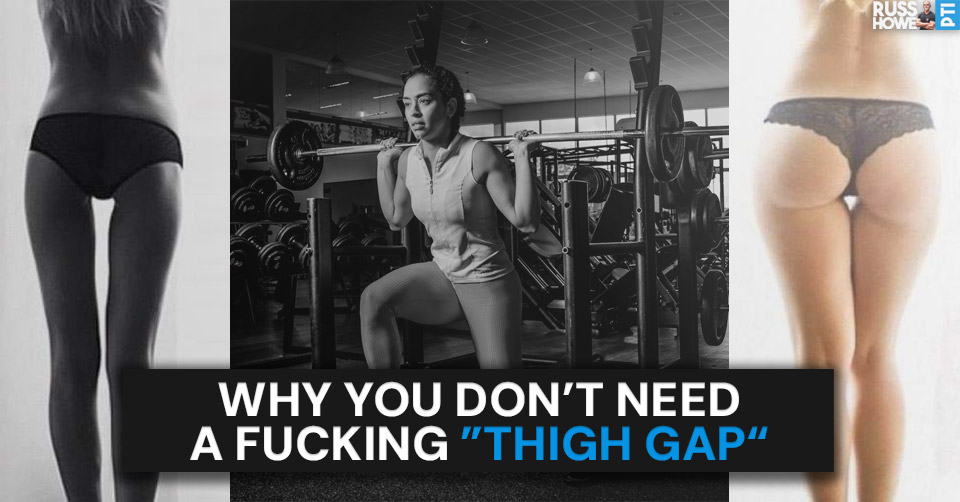I believe the current “thigh gap” craze encapsulates everything that’s wrong with social media.

As if women needed more pressure to look “perfect”, am I right?
Check out the gut-wrenching email I received last week (shared with permission of course):
“Hey Russ, I have a question. All of my friends have thigh gaps but I do not. Whenever we take pictures and put them online they (and the comments) inevitably make jokes about how thick my legs are versus theirs. I’m only a size 10, so I know I’m not overweight, but I do feel genuinely unhappy with my body because I can’t seem to get the same look they have. Three months ago I visited my local gym where a personal trainer gave me a handful of exercises he said would help me achieve a thigh gap, but it hasn’t worked at all. I was wondering if you could give me some advice on this?”
– Rebecca
Oh, jeez.
The thigh gap trend is currently sweeping through Instagram faster than a maid on two scoops of pre-workout. If you’re not familiar with it, this is where trendy orange folks attempt to make you feel less of a woman if you don’t have a gap between the tops of your thighs.
(Yep.)
So sit back and relax while I debunk the holy hell out of this motherfucking bullshit.

The “Thigh Gap” Craze Must Die
Your bone structure determines whether you have a thigh gap.
Every body is built slightly differently, so some of you are going to have the hip bone placement (something which I know a lot about, having had mine re-structured as a kid) which gives you a thigh gap, whereas others will not have it.
It’s entirely genetic, and this means that a thigh gap is not a trainable factor (kinda like guys beating themselves up for not being tall enough).
There are no exercises which can “get you” a thigh gap, so that explains why you weren’t seeing any results from the stuff given to you by that so-called personal trainer who should’ve fucking known better. (1)
Seriously, give them one of these from me:
Anyway, the fitness world can quickly descend into chaos when new trends arrive, so it’s easy to go online and find advice from liars “experts” who claim to have discovered the big secret.
In the case of the thigh gap, their suggestions range from using resistance bands instead of dumbbells (honestly, your muscles cannot tell the difference!), to following their special low carb diet (I wish I was joking!), to drinking their magical weight loss supplements which taste like they came out of a camel’s foof.
Don’t fall for any of it.
Instead, listen to what Yale School of Medicine had to say on this matter:
“A thigh gap is most affected by your bone structure, specifically the width of your hips and the position of your hips within your pelvis. It is also affected by genetics, which dictate where your body stores fat. Thus, there isn’t a lot you can do to achieve a thigh gap, nor should you try.”
– Elizabeth Gardner, MD

The Dangers Of Trends Like This
Social media can be a very toxic place.
I limit my time on it for that very reason.
A 2018 study found that people who spend lots of time on social media platforms have higher levels of anxiety, poor sleep, and depression – and I’m just talking about general social media usage here (e.g. staring at your phone too long), but when we go deeper into the topic there are even more serious issues. (2)
You see, when we take into consideration the body dysmorphia concerns which are caused by bullshit social media trends like “thigh gaps” and the conveyor belt of unrealistic beauty standards we see every day, it creates an environment for low self esteem, weight gain, and eating disorders. (3)
Fuck that.

Further Reading:
If you enjoyed this blog, then you’ll probably also like reading these.
>> “Mono Diets”, Really?
>> What The Fuck Are “Negative Calorie Foods”?
>> The Detox Industry Is A Dumpster Fire Of Misinformation
References:
- Katch F., et al. Effects of Sit Up Exercise Training On Adipose Cell Size and Adiposity. Research Quarterly for Exercise and Sport (1984).
- Scott H., et al. Social media use and adolescent sleep patterns: cross-sectional findings from the UK millennium cohort study. BMJ Open (2019).
- Aparicio-Martines P., et al. Social Media, Thin-Ideal, Body Dissatisfaction and Disordered Eating Attitudes: An Exploratory Analysis. Int J Environ Res Public Health (2019).







Leave a Reply